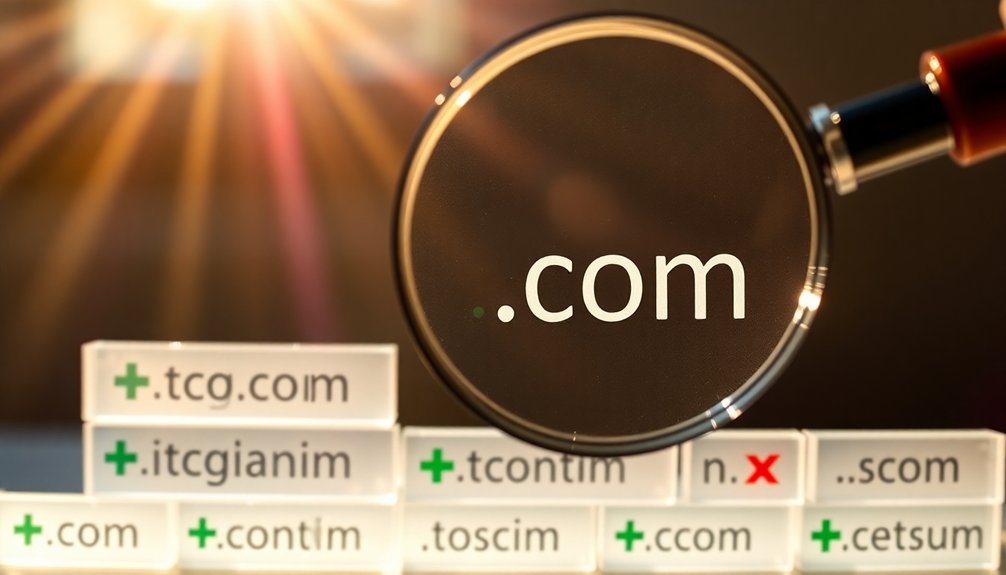
Many overlook the profound impact that domain selection can have on SEO performance. A well-chosen domain not only helps in keyword relevance but also influences user trust and engagement. You might be surprised to learn how different aspects like domain length and extensions create nuances in search visibility. Understanding these factors is essential, as they play a pivotal role in shaping your site's overall digital presence and effectiveness in drawing traffic.
Key Takeaways
- A unique domain enhances branding, which improves user engagement metrics and boosts return rates and referrals.
- Incorporating relevant keywords in the domain improves search engine visibility and attracts organic traffic.
- Shorter domains are easier to remember and type, increasing user retention and site traffic.
- The choice of TLD can influence user trust and perceived credibility, affecting click-through rates and SEO rankings.
- Domain authority, supported by quality backlinks, plays a significant role in improving a site's search engine visibility.
The Importance of Domain Name Selection

When choosing a domain name, you shouldn't underestimate its potential impact on your SEO strategy. A unique domain can help you stand out in a crowded online landscape, contributing to effective branding consistency. It's essential to select a name that aligns with your overall brand identity and offers clarity about your business's purpose. This alignment fosters recognition and trust, both important for long-term SEO success. Additionally, guarantee that your domain reflects uniqueness to avoid confusion with competitors, which could dilute your brand's equity. The way users perceive your domain influences their likelihood of returning to your site or referring others, thereby enhancing user engagement metrics that search engines value highly. Elevate your SEO approach by prioritizing thoughtful domain selection. Consider exploring expired domain opportunities to potentially leverage existing authority and valuable backlinks for improved search rankings.
How Domain Keywords Impact SEO
Choosing domain keywords strategically can greatly influence your site's SEO performance. When you incorporate highly relevant keywords into your domain, it enhances your site's keyword relevance, signaling to search engines what your content is about. This relevancy helps in achieving higher rankings on search engine results pages (SERPs). Additionally, a domain with strong keywords can contribute to building domain authority over time, as it attracts more organic traffic and backlinks. Make certain the chosen keywords resonate with your target audience, as this can improve click-through rates. Avoid overstuffing and focus on clarity, so search engines and users easily understand your site's purpose. Consequently, utilizing effective domain keywords is essential for optimizing your overall SEO strategy and fostering long-term success. The emergence of new gTLD options provides additional opportunities to incorporate industry-specific keywords into your domain extension.
The Role of Domain Length in User Experience

How does domain length impact user experience? Shorter domains tend to enhance user retention by making it easier for users to recall and type the address. Users often prefer concise, memorable domains, which can lead to higher traffic and engagement. When you optimize for brevity, you're actively improving navigation and usability. Domain age advantages become particularly evident when established domains demonstrate higher trust and visibility in search rankings.
| Domain Length | User Retention Rate |
|---|---|
| 5-10 characters | 75% |
| 11-15 characters | 60% |
| 16-20 characters | 45% |
| 21-25 characters | 30% |
| 26+ characters | 15% |
Geographic Domains and Local SEO
When optimizing for local SEO, the choice of domain extension can greatly impact your visibility in regional searches. Incorporating local keywords into your domain not only enhances relevance but also signals geographic intent to search engines. Additionally, employing targeted geographic strategies allows you to effectively connect with specific audiences in your area. Maintaining accurate WHOIS data is essential for establishing local business legitimacy and trust with search engines.
Importance of Domain Extensions
While many elements influence your site's SEO performance, domain extensions play a significant role, particularly for businesses targeting local markets. Choosing relevant extensions like .co.uk or .ca can enhance your domain reputation, signaling authority and relevance to local audiences. These extensions indicate to search engines that your content is tailored for specific geographic areas, improving ranking potential in local search results. When users see a localized domain extension, they're more likely to trust your website, as it aligns with their regional expectations. This trust can directly impact click-through rates, contributing to overall SEO success. Therefore, selecting the appropriate domain extension isn't just a technical detail—it's essential for establishing your online presence effectively in your targeted geography. Proper DNS resolution speed is crucial for maintaining fast page loading times, which is another key factor in SEO rankings.
Local Keywords in Domains
Incorporating local keywords into your domain can greatly enhance your website's visibility in local search results. By strategically including relevant geographical terms, you can improve keyword relevance, helping search engines understand your site's focus. For instance, if you operate a coffee shop in Seattle, a domain like "SeattleCoffeeShop.com" signals to both users and search engines your specific location and services. This specificity increases the likelihood of appearing in local search queries, drawing more targeted traffic. Furthermore, local keywords can differentiate your business from competitors. As search algorithms evolve, prioritizing local content, having a domain that resonates with your geographic area can greatly boost your SEO strategy, making it essential for capturing and retaining local audience attention.
Geographic Targeting Strategies
To effectively engage with local audiences, implementing geographic targeting strategies is essential. By using geo targeting tactics, you can tailor your online presence to specific regions, greatly boosting your local SEO. This involves utilizing geographic domains, such as .nyc or .london, which can enhance search relevance for local queries. Additionally, integrating local content—like blogs about community events or partnerships with local businesses—cultivates stronger connections with your audience. Don't overlook the importance of location-based keywords in your headers, meta descriptions, and content. Moreover, leverage Google My Business and local citations to improve visibility. By strategically focusing on these elements, your website will attract more relevant local traffic and rank higher in regional search results.
The Significance of Domain Extensions
When considering SEO, the choice of top-level domain (TLD) can greatly influence both trust and credibility. Different TLDs convey distinct signals to users and search engines; for example, a .org might imply a nonprofit purpose, while a .com is often seen as more commercially trustworthy. Understanding these implications helps you align your domain extension with your brand strategy and audience expectations.
Impact of TLDs
While many factors influence search engine optimization (SEO), the choice of top-level domain (TLD) can greatly affect your website's visibility and credibility. TLD relevance plays an essential role in how search engines interpret your site's purpose, often influencing rankings. For instance, countries favor specific TLDs, which align with their audience's expectations. By staying updated with TLD trends, you can leverage the right domain extension to enhance local SEO efforts. Additionally, choosing a relevant TLD can signal expertise in particular industries, making your site more appealing; a .edu or .org generally instills trust compared to a less recognized extension. Ultimately, your TLD selection should align with your branding goals while considering its potential impact on search engine visibility.
Trust and Credibility
Trust and credibility are paramount in establishing a strong online presence, and your domain extension can greatly influence how users perceive your site. When users encounter a domain with a familiar extension, like .org or .edu, they often assign higher trust signals, enhancing your domain reputation. Conversely, less recognizable extensions might raise red flags, leading to skepticism about your site's legitimacy. Google's algorithms also consider domain extension as a ranking factor, reinforcing the importance of a trustworthy domain for SEO. To foster trust, choose an extension that aligns with your business identity and audience expectations. Ultimately, a well-chosen domain extension serves not just as an address but as a significant asset in shaping user perception and enhancing your online authority.
Brandability and Trustworthiness of Domains

A domain's brandability and trustworthiness play an essential role in how users perceive a website. When you choose a domain, consider its domain relevance and industry alignment to enhance user perception. A memorable domain with a high memorability factor fosters audience connection, boosting social sharing and overall engagement. Brand consistency across your online presence reinforces marketing alignment, which can notably influence search behavior. Trustworthy domains offer a competitive advantage, as users are more likely to click on a website they recognize and feel secure using. Ultimately, your domain choice not only shapes how users view your site but also impacts your SEO by influencing click-through rates and potential backlinks. A strong domain can lead to sustained online success.
Evaluating Existing Domains for SEO Value
Evaluating existing domains for their SEO value involves a thorough analysis of several key factors. Start by analyzing the domain authority, which indicates how well a domain can rank on search engines. Next, examine the backlink profile, as quality backlinks greatly impact your site's credibility and visibility. You'll want to verify these backlinks come from relevant, high-authority sites.
| Factor | Importance |
|---|---|
| Domain Authority | Determines ranking potential |
| Backlink Quality | Influences credibility and traffic |
| Anchor Text Diversity | Enhances SEO relevance |
| Spam Score | Indicates potential penalties |
Frequently Asked Questions
How Often Should I Change My Domain for Better SEO?
You shouldn't frequently change your domain. Domain longevity boosts authority, while content relevance guarantees search engines view your site as valuable. Focus on optimizing your current domain instead of chasing constant changes for better SEO.
Do Expired Domains Automatically Improve SEO Performance?
Expired domains don't automatically improve your SEO performance. Their potential lies in existing domain authority. If you're considering using one, assess its backlink profile and relevance to your content for best results.
Can Multiple Domains Hurt My SEO?
Yes, multiple domains can hurt your SEO if they dilute domain ownership and keyword relevance. Search engines might perceive overlapping content as spammy, which negatively impacts your overall rankings and authority in the niche.
How Does My Domain Affect Social Media Rankings?
Your domain affects social media rankings through domain authority and social engagement. Higher authority attracts more shares and interactions, boosting visibility. Strong engagement signals relevance to platforms, enhancing your overall online presence and reach.
What Is the Impact of Subdomains on SEO?
Imagine maneuvering a complex web: your subdomain strategy can either light the path to higher search rankings or weaken your site's subdomain authority. Misdirected efforts may dilute focus, hindering visibility across the vast digital landscape.
See The Next Blog Post
In summary, selecting the right domain is essential for maximizing your SEO potential. Notably, studies show that 70% of consumers trust a brand more if its domain name reflects its business purpose. By focusing on relevant keywords, keeping your domain concise, and choosing the right extension, you enhance both user experience and search engine rankings. Remember, your domain isn't just an address; it's an integral part of your online strategy that can greatly influence your visibility and credibility.











